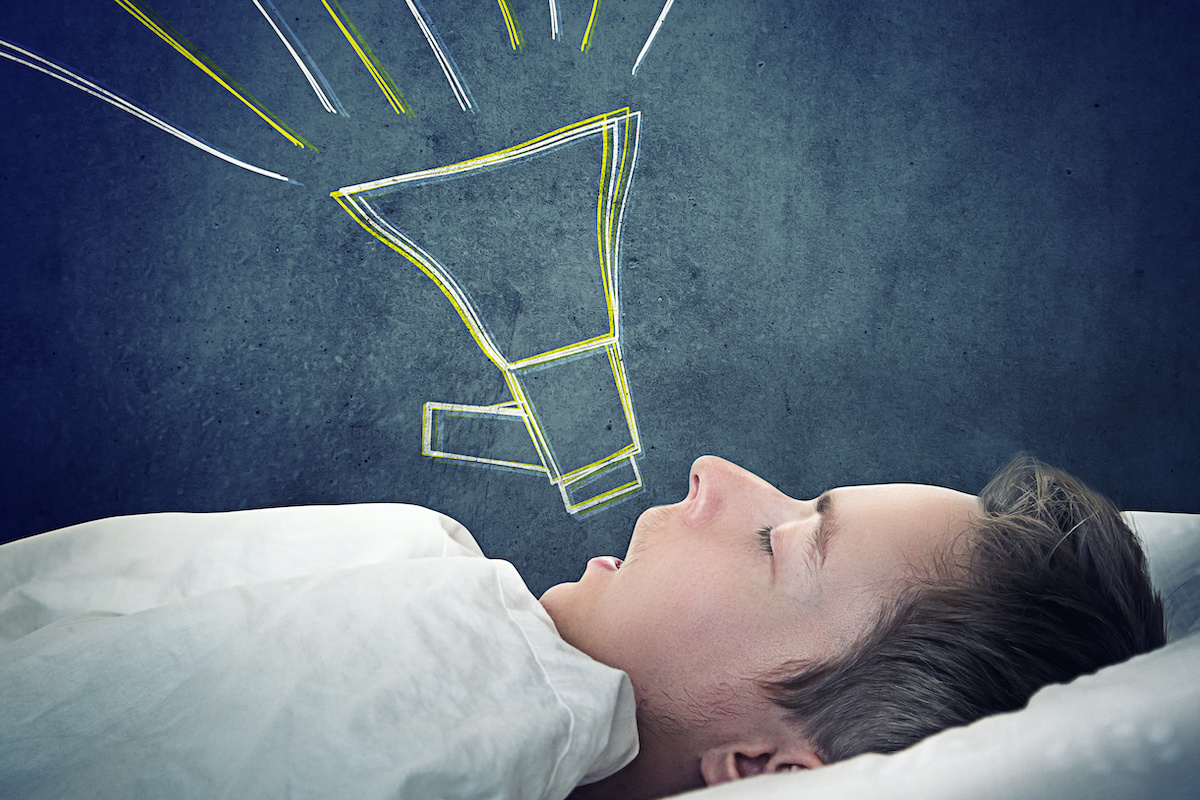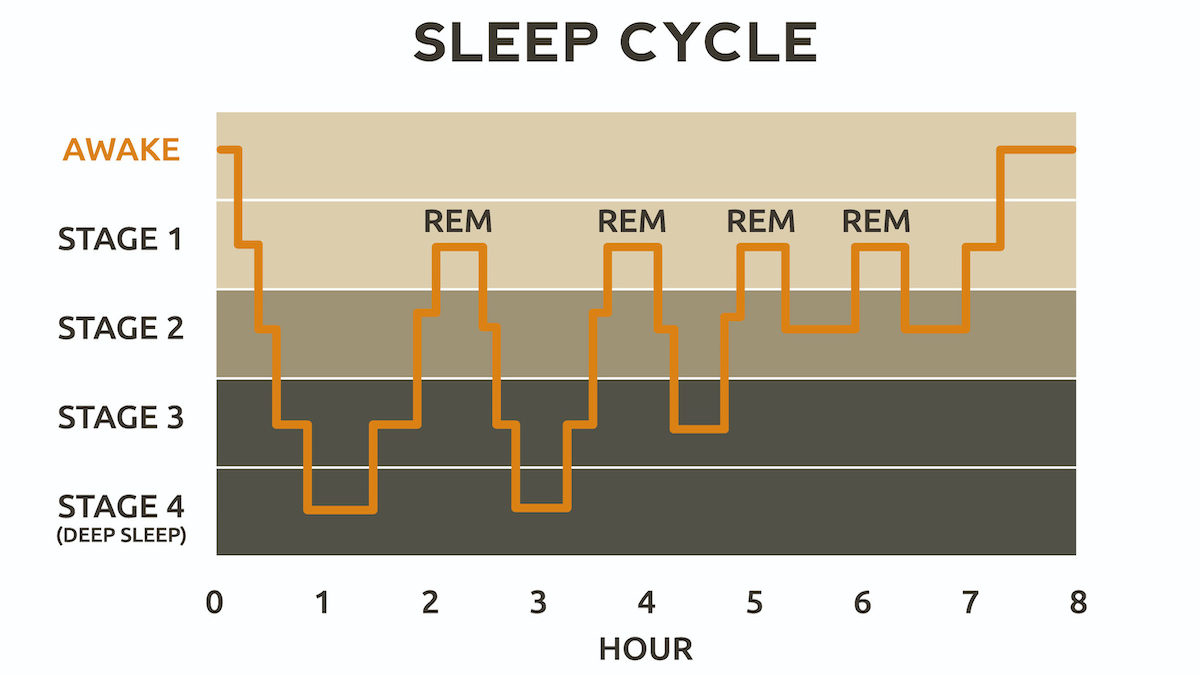Why Do Some People Sleep Talk and How Can You Prevent It?

I first found out that I sleep talk at the age of 12. It was the second day of a week-long school trip and the other kids in my dorm were teasing me about my midnight mumbling. Apparently, I had been yelping “hunter, hunter” in my sleep, a fact made funnier to my classmates for it was also the surname of a boy in our year. Now, I prefix this by saying I had never thought about this boy, and have not since. Perhaps, my subconscious was telling me otherwise, but it’s more likely I was being chased, a nightmare scenario that I don’t recall dreaming about too often, if only when re-enacting an episode of TV series Hunted.
Funnily enough, about 50 percent of children engage in sleep talking, otherwise known as somniloquy, while only a small proportion of adults talk in their sleep, mostly men (apparently we’re also more likely to be foulmouthed when we do so).
While my sleep talking heyday remains mostly in my childhood, I have continued to sleep talk in spurts through adulthood. My partner has recounted having full-on conversations with me about various mundane activities while I’ve been in a deep slumber. I don’t remember these, and find them quite amusing, if not a little disconcerting. It’s always had me wondering about what might be behind my mutterings.
It wasn’t until researching for an interview with lucid dreaming expert Charlie Morley that I stumbled upon a possible explanation in his new book, Wake Up to Sleep: 5 Powerful Practices to Transform Stress and Trauma for Peaceful Sleep and Mindful Dreams.
“Sleep talking…can happen in REM dreaming as well as deep sleep,” he writes, “and although it usually only affects about five percent of adults, in populations working with trauma, this percentage is much higher.”
Could it be some unresolved trauma behind my sleep talking then?
It Doesn’t Have To Be Trauma
“It’s more like if you do have trauma and PTSD, then don’t be surprised if you sleep-talk, and that’s totally normal and should be depathologized,” explains Morley during our conversation. “But if you do sleep-talk, and you are not traumatised, then please don’t think that that’s a sign of some unresolved trauma.
“It’s a bit like kids who have night terrors. A lot of children have night terrors, not due to some trauma, but actually due to a certain part of the brain that becomes activated. When they’re about six or seven you get this growth spurt in the brain. So because the brain is being stimulated when they sleep, often these kids start sleep talking. And the parents freak out, when actually it’s a sign that your child’s brain is growing.”
If you’re sleep talking and having nightmares, then Morley does admit it could be a sign of trauma, but stresses the need to keep calm and not to worry. “We want nightmares to happen after a traumatic event, so we don’t want that to stop either. We want to allow that to happen.”

Why Are We Making Sounds?
Ok, it might or might not be trauma, but why aren’t my dreams staying shtum? Well, sleep talking can happen in both non-REM sleep — the beginning part of sleep — and REM sleep, which occurs around 90 to 120 minutes after you fall asleep and is usually accompanied by vivid dreaming.
When it happens during REM sleep it’s caused by a motor breakthrough of dream speech. “In REM your body’s paralysed, to stop you acting out your dreams, right?” says Morley. “But two parts of your body aren’t paralysed. Your eyes, hence rapid eye movement, and your respiratory system, because you still need to be breathing. Now, what is talking but air flowing over the vocal cords, creating sounds that we decode into meaning. Out of all the things that can still happen, movement wise, when you’re paralysed in dream, talking is one of them.”
Most of the time when we’re dreaming we won’t sleep talk, but when we have a motor breakthrough, caused by a rising intensity or emotion in the dream, the paralysis mechanism is briefly broke. This is why sleep talking is most often related to nightmares. But, there are other possible explanations.
“Sometimes it’s the same way with sleepwalking in that certain brain regions are stimulated when we sleep because of genetics, or because of high levels of stress, or because of medication or drugs,” explains Morley, “and then sometimes the thing that usually paralyses the ability to speak when we’re asleep is broken through. So it’s not always linked to trauma, but sometimes it is.”
Sleep talking may also occur during what are called transitory arousals, when your becoming half-awake while transitioning from one stage of non-REM sleep to another. Often these are characterised by slow speech or confused thinking, and occur within the first two hours of sleep before your REM sleep kicks in.

What Can You Do To Prevent Sleep Talking?
As with any sleep disorder, noting down your dreams in a nocturnal journal is a good start. Doing this will help you notice any patterns, allow you to readily access your past dream history, and start to understand if there are any underlying issues that are contributing to your sleep talking.
“The best way to stop nightmares is to let them know you’re listening, because a nightmare’s a dream that’s shouting,” explains Morley. “So I say with a nightmare, write it down, draw it, speak about it to a friend, give the nightmare your attention. The same with the sleep talking. If you share a bed with someone, or if you’re aware of what you’re saying in your sleep, write it down.”
Reducing your alcohol intake and caffeine consumption past midday can also help as both are known to affect your sleeping pattern. Focus on improving your sleep quality and reducing stress before bedtime. Breathing techniques that inspire relaxation like the 4,7,8 breath — inhaling for a count of four, holding your breath for a count of seven and then exhaling for a count of eight — will also help tackle those lurking causes.
Form’s ZZZZs capsules naturally promote a restful and regenerative night’s sleep using a mixture of plant-based ingredients and potent nootropics. A capsule 30 minutes before bed enhances serotonin production with 5-HTP, in turn producing melatonin to keep your biological clock in sync. Calming amino acids L-Glycine and L-Theanine, meanwhile, have been shown to reduce sleep onset time and promote relaxation.


















